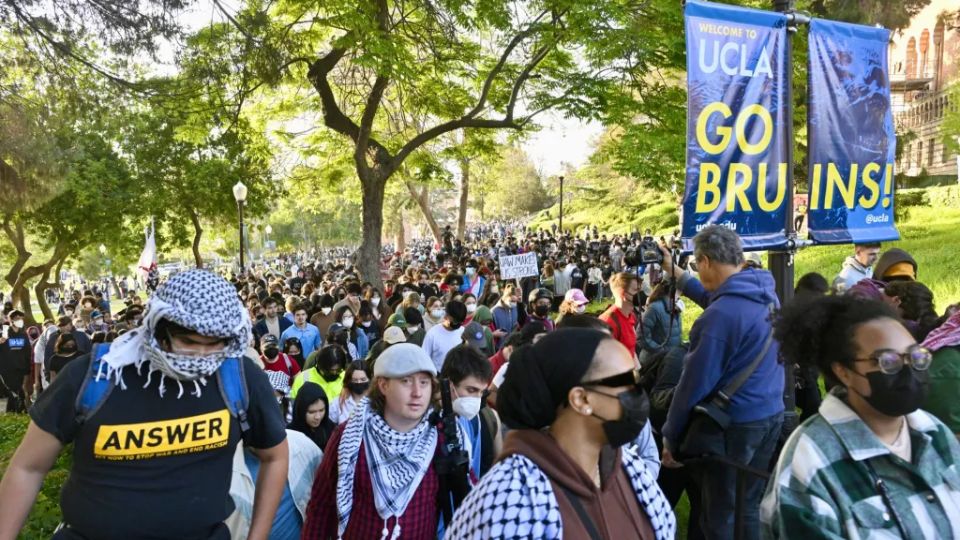Less than 24 hours after a violent attack on a pro-Palestinian camp at UCLA, it seems like the authorities are getting ready to close down the camp by declaring it an unlawful assembly.
The decision was made by UCLA Chancellor Gene Block on Tuesday and he announced the university’s intentions. The University of California usually handles protests in a less aggressive manner compared to USC, Columbia, and other campuses. These campuses have called in the police, resulting in the arrest of hundreds of students.
In a statement earlier on Tuesday, University of California President Michael V. Drake expressed his complete support for UCLA’s action. The University of California (UC) needs to prioritize flexibility when it comes to free speech, but it also has a responsibility to take action when student learning and expression are hindered, university functions are disrupted, or safety is at risk.
On Wednesday evening, students stood side by side to stop law enforcement from reaching the encampment. There were more than twenty-five vehicles from the Los Angeles County Sheriff’s Department lined up down the hill from the tents. Police officers wearing protective gear confronted the students.
“They won’t arrest you until they give a dispersal order,” one student shouted to the crowd.
“If you don’t want to get arrested, don’t stand in the front,” another student organizer shouted.
Recently, UCLA, along with other universities in the country, has become a center of pro-Palestinian activism.
Also Read: Weather Disasters Pushing Insurance Companies to Raise Prices and Drop Customers
Students, faculty, and staff have set up temporary camps and are asking for an end to the war in the Gaza Strip. They also want their universities to stop investing in companies that sell weapons or services to Israel.
The protest at UCLA had been relatively calm compared to other campuses until Tuesday just before midnight. A big group of people who support Israel came wearing black clothes and white masks. They arrived and tried to remove the barriers around the camp.
Inside the camp, there were people who were holding pieces of wood and wearing goggles and helmets. They gathered together to protect the area around the camp.
For many hours, people who were against the demonstration threw things like wood and a metal barrier at the camp and the people inside. There were many fights that happened over and over again. Some people attempted to enter the camp forcefully, and the pro-Palestinian group used pepper spray to protect themselves. Someone set off fireworks in the camp.
It took three hours for the attack to be stopped. Officers from the California Highway Patrol, Los Angeles Police Department, and other agencies came and brought back peace. People were upset and wanted to investigate because the response was slow.
On Wednesday after 6 p.m., UCLA police used loudspeakers to tell protesters that they needed to leave the area right away. They warned that anyone who didn’t leave would be arrested.
The people inside the encampment were feeling nervous, but not extremely scared, as they stood behind the plywood barricades. People were giving out respirators, masks, and buckets to fill with water in case they needed to rinse tear gas from their eyes. A woman is giving cookies, grapes, and granola bars to protesters. She said, “This is the revolution.” You need to eat.
Another person, who seemed to be concerned about their future job opportunities, said they were “trying to get arrested but not for a serious crime.”
At the road across from the encampment, many people who support Palestine gathered and walked onto the driving lanes in front of Dickson Plaza. They chanted, “From the river to the sea, Palestine will be free.”
Some people at the protest held a sign that seemed to express a broader message: “From Palestine to Mexico, all the walls need to be removed.”



Leave a Reply